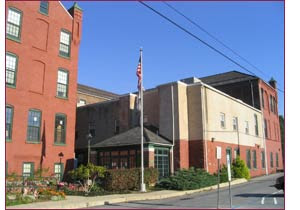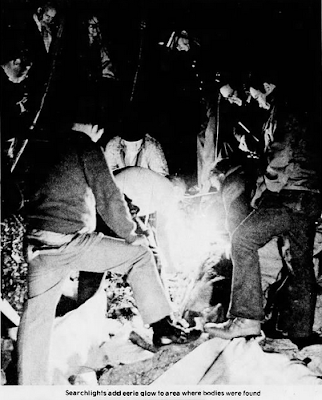Fountain Hill's Haunted History
 |
| The old Fountain Hill silk mill |
Incorporated in 1893, the borough of Fountain Hill is rich in history. In Colonial times, the land was owned by the Moravians, whose influence can still be seen in structures such as the Cornelius Weygandt house, built in 1755. Fountain Hill was later the home of Dr. Francis Henry Oppelt's Hydropathic Institute, which operated until 1871, and was also the birthplace of iconic American author Stephen Vincent Benet.
Fountain Hill, however, also has a haunted history.
One strange series of hauntings took place in 1901, involving a tall white figure of a man, a ghostly woman, and a phantom dog. The following appeared in the January 17, 1901 edition of the Allentown Leader:
Fountain Hill folks are in the throes of excitement and fear on account of the stalking about night and day of an alleged ghost. The spectre has caused several frights to both adults and children and has proven its fearlessness by accompanying a young man for several blocks to his home.
The other day a child, in descending the cellar stairway of the family home, was given a scare by what she said was the ghost, and which she said she saw through the cellar grating. The ghost, or whatever it may be, confines itself to no particular locality of Fountain Hill. Those who claim to have seen it state that it is a tall figure of white, walks with a noiseless tread, and at times dissolves from view. Other ghosts, one in the shape of a monster dog, and another in the form of a woman, have at times been reported to have been seen by Fountain Hill folks.
Some skeptics might argue that the citizens of Fountain Hill may have been of a superstitious bent. But that argument doesn't explain the following incident, which befell a South Bethlehem family during their first night in Fountain Hill. In 1903, this family was forced to flee their new Fountain Hill home after a spectacular series of bizarre events. The December 17, 1903 edition of the Reading Times relates the following story:
Fountain Hill has a haunted house. According to the stories told, weird, unearthly sounds are heard in it every night. The house has been vacant for some time, but one day last week a South Bethlehem family moved into it. They moved out again the next day. The abrupt departure of the tenants was due, it is claimed, to the spirits that haunted the premises. The spirits were rather musically inclined. One of their favorite disturbances was playing the piano at the witching hour of midnight, when ghosts do stalk. None of the South Bethlehem family who occupied the house one day and night is a musician, and the midnight serenade was not at all appreciated. The spirits furnished their own instrument for the occasion.
The piano renditions were followed by ghostly screams and then came a series of noises and a medley of rackets that were more blood-curling than musical. The women folks and children of the South Bethlehem family slept very little the only night they were in the house. When morning came they insisted upon leaving it at once.
For a town of just a few thousand, Fountain Hill has certainly had its share of bloody history, which perhaps might explain its notorious hauntings. In 1895, a murder occurred on the Emmaus Road, about 200 yards away from the Lipps & Sutton Silk Mill when two neighbors who lived on nearby Stony Lane got into a rum-fueled argument. Jacob Luckey, a drunkard with a mentally-deranged wife (or so it was reported), grew furious after his wife sought shelter for the night at a neighbor's home after a family quarrel. John Mullock, who had given shelter to Mrs. Luckey, was shot in the brain at point blank range with a .32-caliber pistol in broad daylight on the morning of June 4. On his walk home, Luckey climbed a cherry tree and hanged himself with a noose fashioned from a washline.
Another memorable incident in the town's history happened a few years later at the Fountain Hill Opera House. In March of 1899, two men who had attended a performance at the opera house bumped into each other in the crowded vestibule. Though the shove was accidental in nature, the man who bumped into Herman Rodgers was repaid with a punch in the face. The victim, Robert Hittel, fractured his skull when he hit the stone steps, choking on his own false teeth in the process.


Comments
Post a Comment